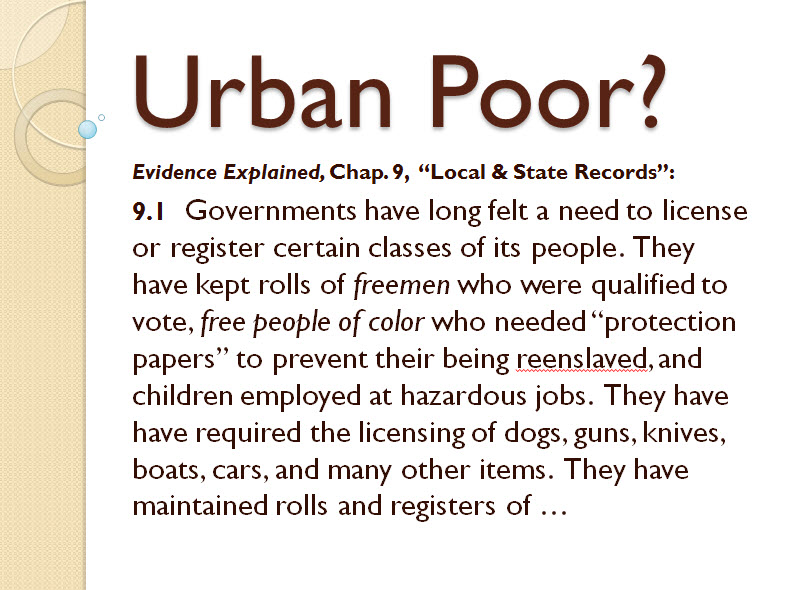20 May 2014
Our Tuesday's Test for 6 May was a bit of a stumper: What records can we use to trace the urban poor? Given that EE is all about sources and evidence, not just citation formulas, we might even call that a trick-question-of-sorts. So we'll ask another: When you feel you are at a dead end and don't know what other resources might exist to help with your problem, do you pull your handy-dandy copy of EE, scan the list of sources covered under each chapter, and compile a list of items you have not yet used?
For the urban poor, as an example, EE's chapters on local and state records offer the following:
- 8.18-19: Court Records--published reporters & unpublished minutes & files.
- 8.21 Bastardy Cases (Presentments)
- 8.22 Performance Bonds
- 8.23 Coroners' Inquests
- 8.24 County Commissioners' Records
- 8.25 Divorce & Separation Cases
- 8.26 Election Certificates & Returns
- 8.27 Indigent Records and Rolls, Warnings out, etc.
- 8.28 Insanity Hearings
- 8.29 Jail Records
- 8.30 Jury Lists
- 8.31 Naturalization Records (local)
- 8.33 & 9.10 Pension Affidavits
- 8.34 Town Records
- 9.1 Licenses for dogs, guns, knives, etc.
- 9.4-5 Marriage intents, licenses, bonds, and returns
- 9.9 Militia rolls
- 9.13 Soldier Discharge Registers
- 9.14 Veteran, Widow & Orphan Rolls
- 9.16 Child Labor Affidavits & Licenses
- 9.17 Free Papers, Licenses & Registrations (for fpc)
- 9.19 Dog Licenses
- 9.23 Voter Rolls
- 9.25 Indentureships
- 9.27 Manumissions
- 9.28 Mortgages & Sales of Servants (early years)
- 10.7 Miscellanea in Deed Books
- 10.11 Mortgages of Personal Items
- 10.27 Notarial Records (in towns & cities founded by French & Spanish)
- 10.38 Tax rolls (even the poor were charged poll taxes, all the way back to colonial days!)